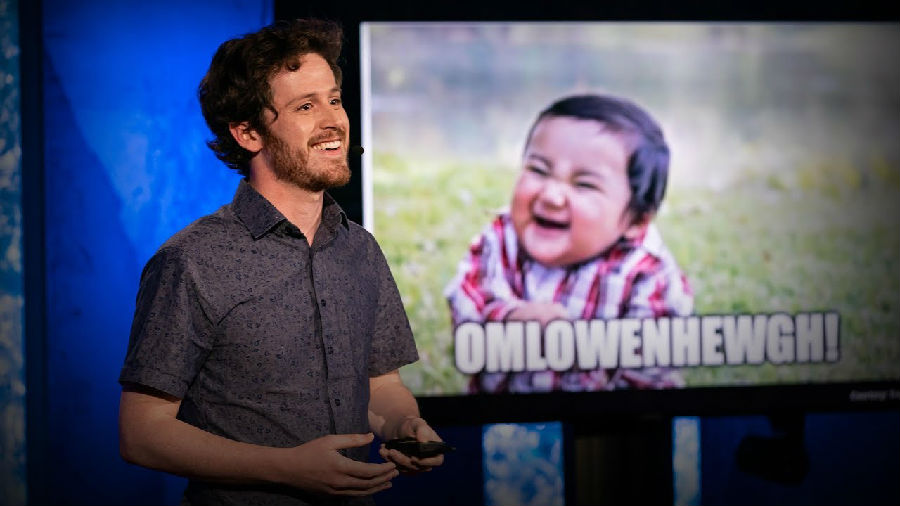(单词翻译:单击)
Languages don't just die naturally.
语言不会自动消失。
People abandon mother tongues, because they're forced to. Often, the pressure is political.
人们被迫抛弃母语,经常是因为政治原因。
In 1892, the US Army general Richard Henry Pratt argued that
在1892年,美国陆军将军里查德·亨利·普拉特认为
killing indigenous cultures was the only alternative to killing indigenous people.
消灭土著文化是取代屠杀的唯一替代方式。
"Kill the Indian," he said, "but save the man."
他说:“杀了印第安文化,却不杀人。”
And until 1978, the government did just that, removing indigenous children from their families
直到1978年,政府一直采取了这样的措施,让土著孩子离开家人,
and forcing them into boarding schools where they were given English names and punished for speaking their languages.
逼迫他们去寄宿学校,给他们英文名,不让他们说他们的语言。
Assimilation was a compliment to genocide.
这种文化的融合和种族灭绝差不多。
Seven thousand languages are alive today, but few are recognized by their own governments or supported online.
现在世界上有7000种语言,但是被当地政府认可,或在网络上被认可的寥寥无几。
So for people from the vast majority of cultures, globalization remains profoundly alienating.
所以,对于绝大多数文化背景的人,全球化会让他们越来越疏远。
It means giving up your language for someone else's.
这意味着,要为其他语言而放弃自己的母语。
And if nothing changes, as many as 3,000 languages could disappear in 80 years.
如果事情没有改变的话,3000种语言会在80年之内消失。
But things are changing. Around the world, people are reviving ancestral languages and rebuilding their cultures.
但是事情正在变化。世界各地,人们都在复活祖先的语言,并重建他们的文化。
As far as we know, language reclamation began in the 1800s when, at a time of rising antisemitism,
据我们所了解的,复苏语言的工作开始于反犹太主义猖狂的十九世纪,
Jewish communities looked to their ancestral language, Hebrew, as a means of cultural revival.
犹太人民认为他们的祖先语言,希伯来语,是一种文化复兴的方式。
And though it had been dormant for over 1,000 years, it was well preserved in books of Jewish religion and philosophy.
虽然希伯来语已经沉睡了一千多年,但它还是被犹太宗教和哲学的书籍完好地保存了下来。
So Jewish activists studied and taught it to their children, raising the first native speakers in nearly 100 generations.
所以犹太学者研究了并教育他们的孩子希伯来语,养育了近一百代里的第一代以希伯来语为母语的犹太人。
Today, it's the mother tongue of five million Jews.
现在,希伯来语是超过五百万犹太人的母语。
And at least for me, an assimilated English-speaking member of the Jewish diaspora, a pillar of cultural sovereignty.
至少对于我来说,作为一个说英语的犹太人,这是文化自治的表现。
Two thousand years later, we're still here. Now, until recently, Hebrew's reawakening was an anomaly.
两千年后,希伯来语还存在。一直以来,希伯来语的复苏仍是一件不寻常的事情。
Few languages are as well preserved as ours was, and the creation of Israel,
很少有语言像希伯来语一样保存的如此完好,再加上以色列的诞生,
the first Jewish state in over 1,000 years, provided a space for Hebrew's daily use.
这是一千年来第一个犹太国家让希伯来语能够被日常使用。
In other words, most cultures just weren't given a chance.
换句话说,很多文化都没有这样的机会。
That was Cornish, the ancestral language of Cornwall, which today is technically a county in southern England.
这是康沃尔语,康沃尔的祖先语言,康沃尔是英格兰南部的一个郡。
In the 1900s, Cornish activists fought for their culture.
在二十世纪初,康沃尔语支持者为了他们的文化进行过斗争。

The language had been dormant for over 100 years, but they used old books and plays to teach it to their children.
这门语言已经沉睡了超过一百年了,但是他们用旧书和话剧来教育他们的孩子。
However, this new generation of Cornish speakers was scattered across Cornwall and unable to use the language freely.
说康沃尔语的新一代零散地散布在康沃尔,不能流畅的使用这门语言。
By the 1990s, Cornish had reawakened, but it wasn't thriving.
到二十世纪九十年代,康沃尔语开始复苏,但是并不繁荣。
Then, in the early 2000s, Cornish speakers found one another online and leveraged digital spaces to speak on a daily basis.
二十一世纪初,说康沃尔语的人找到了一个线上的网络对话空间。
From there, they organized weekly or monthly events where they could gather and speak in public.
从那之后,他们组织了每周或每月的活动,人们可以在公共场合聚集并交谈。
Today, some schools teach Cornish. There are Cornish language signs, ice-cream commercials, Wikipedia, and even memes.
现在,有些学校会教康沃尔语。有康沃尔语的路标,冰淇淋广告,维基百科,甚至网络笑话。
And with their language once again intact,
有了完整的语言系统,
the people of Cornwall have secured recognition as a Celtic nation alongside Ireland, Scotland and Wales.
康沃尔人民已经获得了与爱尔兰、苏格兰和威尔士并列的凯尔特国家的称号。
They stared down centuries of forced assimilation and said,
他们打败了几世纪的文化殖民,并宣告:
"We're not a county in England. We're a people in our own right. And we're still here."
“我们不是英格兰的一个郡,我们是自己的民族。我们并没有消失。”
And they're not the only ones. The Tunica-Biloxi tribe of Louisiana is reviving their ancestral language.
这样的例子还有很多。路易斯安那州的突尼卡比罗西部落也在复活他们的祖先语言。
It started in the 1980s, when Donna Pierite and her family started taking trips to Baton Rouge and New Orleans
从二十世纪八十年代开始,唐纳·皮里特和她的家人去了巴吞鲁日和新奥尔良,
to photocopy old dictionaries stored away in university archives.
复印了大学档案里的旧字典。
The goal was to study Tunica and teach it to the children and share it with the community.
他们的目标是为了学习突尼卡语,并教给孩子和社区里的人们。
Today, they're leading a Tunica renaissance.
现在,他们正引领着突尼卡语的复兴。
Since 2014, there are nearly 100 speakers in language immersion classes,
到2004年,有近100位说突尼卡语的人在上语言课,
and according to a 2017 census, 32 new fluent speakers,
根据一个2017年的普查,新增了32个能流利使用突尼卡语的人,
some of whom, like Donna's daughter Elisabeth, are teaching Tunica to their children.
其中有唐纳的女儿,伊丽莎白,在教她们的孩子突尼卡语。
These new speakers are creating content, Facebook videos and also memes.
这些人在创造内容、脸书视频和网络笑话。
And the more they publish, the more they inspire other Tunica people to get involved.
他们创造得越多,越来越多的突尼卡人就会加入他们。
Recently, a tribal member living in Texas wrote Elisabeth on Facebook, asking how to say "bless these lands."
一个住在德州的部落成员在脸书上问伊丽莎白如何说:“保佑这些土地。”
It was for a yard sign, so she could show her neighbors that her culture is alive and thriving today.
它要来当一个院子的标志,所以她可以告诉她的邻居,她的文化现在还活着并很繁荣。
Now, Hebrew, Cornish and Tunica are just three examples from a groundswell of language activism on every continent.
希伯来语、康沃尔语和突尼卡语只是世界各地语言复苏的三个例子。
And whether they're Jèrriais speakers from the Channel Isles, or Kenyan sign language speakers from Nairobi,
从在海峡群岛说耶里亚斯语的人,到在内罗毕说肯尼亚手语的人,
all communities working to preserve or reclaim a language have one thing in common: media, so their language can be shared and taught.
所有保护和复兴一门语言的工作都有一个共同点:媒体。媒体让语言能够被分享和教导。
And as the internet grows, expanding media access and creation,
随着互联网的增长,媒体的获取和创造也更简单了,
preserving and reclaiming ancestral languages is now more possible than ever.
让保护和复兴祖先语言从未有过的变成了可能。
So what are your ancestral languages? Mine are Hebrew, Yiddish, Hungarian and Scottish Gaelic, even though I was raised in English.
你的祖先语言是什么?我的是希伯来语、意第绪语、匈牙利语和苏格兰盖尔语,虽然我在英语环境里长大。
And luckily for me, each of these languages is available online.
我很幸运,这些语言再网上都有。
Hebrew in particular -- it came installed on my iPhone, it's supported by Google Translate, it even has autocorrect.
特别是希伯来语,我的手机上就有,谷歌翻译也支持,甚至还有自动纠错。
And while your language may not be as widely supported, I encourage you to investigate,
即使你的语言没有很多资源,我也鼓励你做些研究,
because chances are, someone, somewhere, has started getting it online.
因为有可能某个地方的某个人正在开始创造资源。
Reclaiming your language and embracing your culture is a powerful way to be yourself in the age of globalization,
复兴你的语言和接受自己的文化是在全球化中保持自我的重要方法,
because as I recently learned to say in Hebrew, "'nḥnw 'dyyn k'n" -- we're still here. Thank you.
正如我刚学会的希伯来语所说,“'nḥnw 'dyyn k'n”,我们还存在。谢谢。


